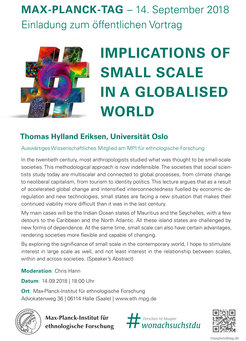Diese Veranstaltung fällt aus!
Max-Planck-Tag: Betrachtungen aus dem Hubschrauber und durch die Lupe
Öffentlicher Vortrag von Thomas Hylland Eriksen
Der norwegische Ethnologe Thomas Hylland Eriksen hält am 14. September, um 18:00 Uhr im Max-Planck-Institut für ethnologische Forschung einen öffentlichen Vortrag mit dem Titel: „Implications of small scale in a globalised world“. Der englischsprachige Vortrag findet im Rahmen des Max-Planck-Tags statt, an dem in 32 Städten in Deutschland allen Besucherinnen und Besuchern unter dem Motto "Forschen ist Neugier" die Gelegenheit geboten wird, Forschung bei Max-Planck live zu erleben. Thomas Hylland Eriksen ist Auswärtiges Wissenschaftliches Mitglied am MPI für ethnologische Forschung.
Mehr Informationen zum Max-Planck-Tag finden Sie hier.
„Ich freue mich sehr, dass es uns gelungen ist, diesen höchst renommierten Kollegen für den Vortrag am Max-Planck-Tag zu gewinnen“, sagt die Geschäftsführende Direktorin Marie-Claire Foblets. Eriksen beschäftigt sich seit vielen Jahren mit den Folgen der Globalisierung für die Menschen. Dabei geht es ihm darum, sowohl das Allgemeine als auch das Besondere zu berücksichtigen: „Damit eine Perspektive auf die zeitgenössische Welt überzeugend und umfassend ist, braucht sie den Blick aus dem Hubschrauber, der die Welt umkreist, ebenso wie die Details, die nur mit einer Lupe entdeckt werden können. Das Makro und das Mikro, das Universelle und das Besondere müssen als zwei Seiten einer Medaille betrachtet werden.“ schreibt Eriksen in „An overheated world. A Short Introduction to Overheating”.
Thomas Hylland Eriksens Abstract des Vortrags:
Implications of Small Scale in a Globalised World
Throughout the twentieth century, most anthropologists studied what were thought to be small-scale societies. This methodological approach, which was always problematic in its lack of attention to the larger systems in which these communities took part, is now indefensible. Virtually all societies studied by social scientists are multiscalar and ultimately connected to global processes, from climate change to neoliberal capitalism, from tourism to identity politics. Yet to the extent that a state is a society, which it often is in important respects, small scale continues to be a relevant concept. This lecture argues that as a result of accelerated global change and intensified interconnectedness, fuelled by economic deregulation and new technologies, small states are facing a new situation that makes their continued viability more difficult than it was in the previous century.
My main cases will be the Indian Ocean states of Mauritius (pop. 1.2 million) and the Seychelles (pop. 90,000), with a few glances to the Caribbean and the North Atlantic. Foreign appropriation of property, reduced competitiveness owing to deregulation and decreased costs of transport, the increased presence of the English language and the effects on identity of tourism, mobility and the new media situation on identity result in new forms of dependence and a weakening of self-determination in these island states. On the other hand, small scale can also have its advantages, rendering societies more flexible and capable of changing; approaching a reef, a small sailboat can change course in a matter of seconds, while it takes a tanker a full day or more to perform the same operation.
The comparative study of social and cultural scale has been strangely absent in recent anthropology, since the publication of Barth’s edited volume Scale and Social Organization (1978) and Leach's dismissive comments in his Social Anthropology (1982) about cultural anthropologists comparing ‘the culture’ of China with that of a small Pacific island. By exploring the significance of small scale in the contemporary world, I hope to stimulate some interest in large scale as well, and not least the relationship between scales, within and between societies.

